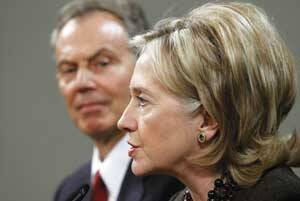With much of Washington focused on health care legislation, the annual release of the State Department’s country reports on human rights practices received little attention this year, though the report helps shape U.S. policy approaches to the world.
Vulnerable populations affected by wars and internal conflicts in many places, including Afghanistan, Sri Lanka, Somalia, Congo and Sudan, were among the major concerns highlighted in the report’s introduction and in remarks by Michael H. Posner, assistant secretary in the Bureau of Democracy, Human Rights and Labor, at its release on March 11. “We live in a world of conflict,” Posner said, with more than 30 wars and internal conflicts fueled by ethnic, racial and religious tensions, which disproportionately affect women, children, people with disabilities and refugees.
He singled out China, Iran, Nigeria and Cuba as countries with notably deteriorating human rights situations in 2009. Egypt, Russia and Sri Lanka were cited for what he called misuse of national security legislation to broadly curtail basic civil rights.
Other nations with generally good human rights records were flagged for enacting or considering official government policies that affect vulnerable groups. Posner included Uganda’s proposed death penalty for homosexuals, discrimination against Muslims in various countries in Europe and sanctions against the Roma in Italy, Hungary, Romania, Slovakia and the Czech Republic.
Posner gave credit to “positive trends” in Liberia, where a truth and reconciliation report and the prosecution of former Presi-dent Charles Taylor are helping heal a country torn by a long civil war. He also noted Georgia’s new criminal procedures, Ukraine’s commission on anticorruption, Bhutan’s transition from absolute monarchy to constitutionally elected government and the first multiparty parliamentary election in the Maldives.
Secretary of State Hillary Clinton promised the State Department would for the first time later this year present an internal report on how the United States measures up against the human rights standard to which it holds other countries. “Human rights are universal, but their experience is local,” Clinton said at the press conference. “This is why we are committed to holding everyone to the same standard, including ourselves.”
She said the United States would participate in the U.N. Human Rights Council’s universal periodic review process. “In the fall, we will present a report, based on the input of citizens and N.G.O.’s, gathered online and in face-to-face meetings across the country attended by senior government officials,” Clinton said.
One issue that the review may touch on is the continued use of the death penalty in the United States, a concern raised by the United Kingdom in its own annual international human rights report on March 17.








